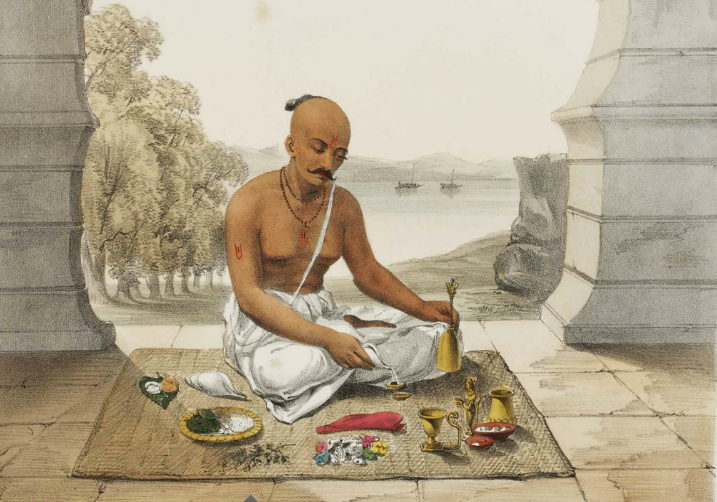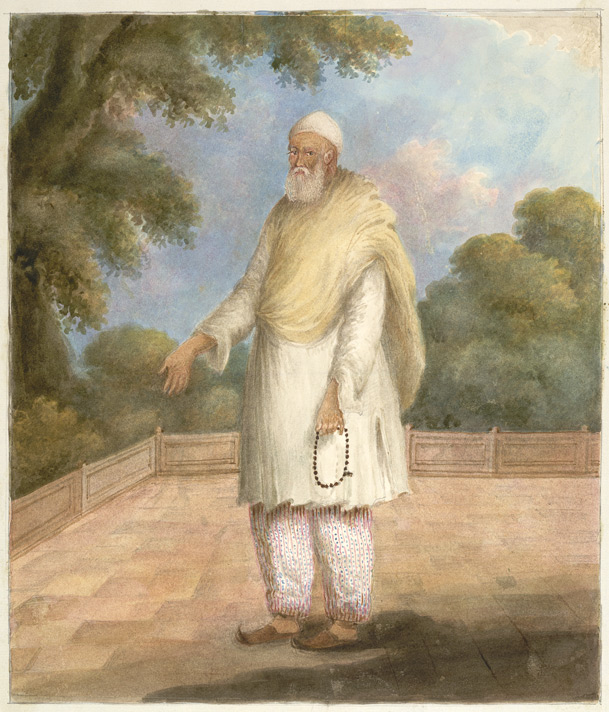FWP:
SETS
ISLAMIC: {10,2}
RELIGIONS: {60,2}
TESTING: {4,4}
As Bekhud Mohani observes, {120,8} is the obvious verse for comparison. The commentators seem sure, as that verse would suggest, that 'faithfulness' means simply 'adhering to one's religious practice for a lifetime'. And yet, in the present verse there are definite hints of other possibilities. The Shaikh and Brahmin, by definition, are users of the coils of prayer-beads and sacred thread that epitomize their religious commitment. Yet the word phande is basically a negative one, and in fact is negative in a heavy and highly-charged way (see the definition above)-- 'noose, snare, trap, difficulty, maze', etc. (Vasmi Abidi points out that it can be used neutrally in contexts like embroidery, to mean simply 'loop', but in general I think Platts is right to emphasize its strong association with the hunter and the hangman.)
=Does this mean that the Shaikh and Brahmin might be 'trapped' or 'ensnared' by their own religious symbols? And if so, would this entrapment occur against their will, so that they'd struggle to escape, the way trapped creatures normally do? If so, they would perhaps succeed, since these nooses have no real 'gripping power'. But what form would their struggle take?
=Or would this 'entrapment' and 'ensnaring' occur without their awareness, such that they'd complacently think themselves well-grounded, or firmly anchored, or otherwise safely bound into their own religious systems? If so, they'd be deluded, since these symbolic coils have no 'gripping power' and thus can't provide any ultimate security.
=Or might the Shaikh and Brahmin themselves be thought of as hunters, seeking with their 'nooses' or 'snares' to capture the Divine? If so, these weapons are ineffective, so that their pursuit is in vain.
Above it all there looms the great question: what is the relationship of 'faithfulness' in the second line to the religious coils in the first line? Toward what end is the 'faithfulness' to be directed? Does 'faithfulness' consist in remaining steadfastly within one's own symbolic 'noose', as the commentators maintain, or in struggling persistently to escape from such narrow 'toils' into some larger religious or philosophical vision? (Along these lines, remember {111,14}.)
Or is 'faithfulness' perhaps a different quality altogether, one that's shown in human relationships quite independently of all religious roles and symbol systems? On this latter reading, the first line is simply dismissive: it doesn't matter at all what religion you belong to, or what symbols you festoon yourself with, for the only important test is your human quality of 'faithfulness'. If we take this to be the usual 'faithfulness' shown by the lover in the ghazal world, then the Shaikh and Brahmin, if they are 'faithful', are lovers pursuing the true, divine Beloved. This is a perfectly possible reading, with an elegance of its own. If we don't adopt it, then we have to decide for ourselves, as Ghalib so often permits or forces us to do, what kind of a quality 'faithfulness' is. I always think of a little aphorism of C. S. Lewis's: 'Courage is not simply one of the virtues but the form of every virtue at the testing point, which means at the point of highest reality'.
Compare also a very different 'Shaikh and Brahmin' verse, {121,9x}. Another verse that juxtaposes prayer-beads and sacred thread: {433x,2}; there's also the more frivolous {438x,8}. And another verse about prayer-beads: {224,3x}. On the nature of the zunnaar , see {60,8}.


Nazm:
The relationship of the Shaikh to the prayer-beads, and of the Brahmin to the sacred thread-- don't consider that they can't emerge from these coils. Rather, consider for how long they uphold these styles [va.za((]. (231)
== Nazm page 231